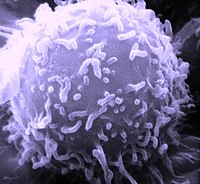
Photo from wikipedia
Antibody/antigen binding results in immune complexes (IC) that have a variety of regulatory functions. One important feature is the enhanced host immune activation against antigen contained in the complex. ICs… Click to show full abstract
Antibody/antigen binding results in immune complexes (IC) that have a variety of regulatory functions. One important feature is the enhanced host immune activation against antigen contained in the complex. ICs play important roles at several critical steps that lead to B and T cell activation, including antigen targeting/retention, facilitated antigen uptake, antigen presenting cell activation and proper balancing of positive and negative stimulatory signals. In both poultry industry and clinical health care, ICs have been used as preventive and therapeutic vaccines. With our deepening understanding of antibody biology, particularly in light of new revelations of regulatory functions of Fc receptors, mechanistically more precise engineering has spearheaded tailored use of this tool for infection control and cancer therapy. IC-based treatment and prophylaxis have been tested to different extents in HBV, HIV and influenza viral infection control and are actively examined as an alternative treatment for several forms of tumor. As a part of this book series, this chapter aims to discuss the mechanistic aspects of IC signaling and their impact on immune cells. We give samples how this old technology has been used by practitioners over the last several decades and suggest potential paths for future development of IC-based immune therapy.
Journal Title: Current topics in microbiology and immunology
Year Published: 2019
Link to full text (if available)
Share on Social Media: Sign Up to like & get
recommendations!